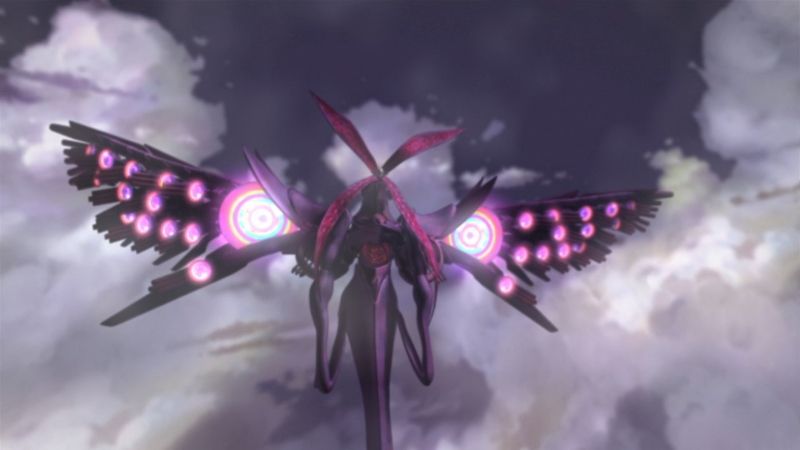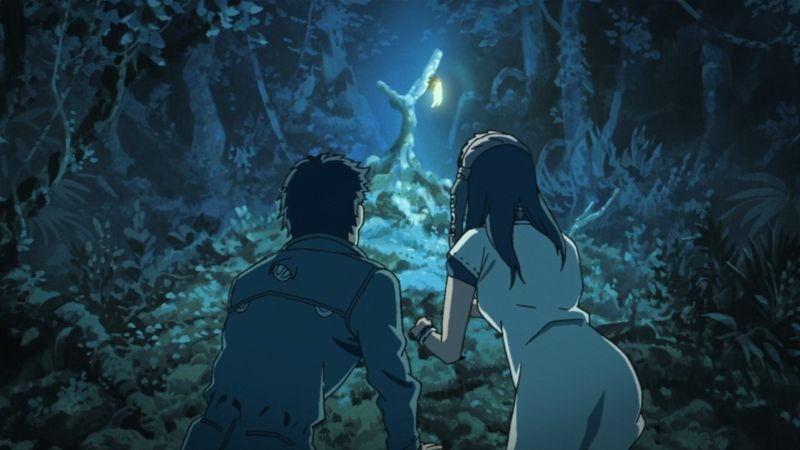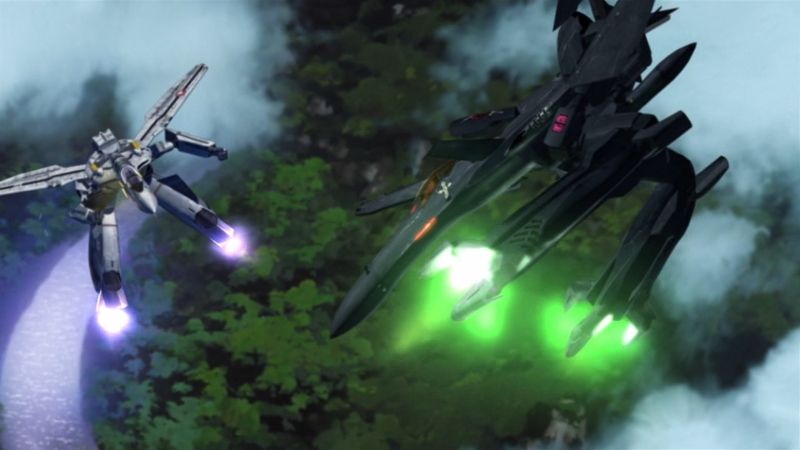Flying under the radar: Macross Zero
In ongoing media franchises, one advantage of a prequel is that it can appeal to both long-standing fans and new viewers who can experience everything in chronological order. Macross Zero was the franchise’s twentieth anniversary celebration project, but it seems to be overlooked today and (anecdotally at least) gets relatively little attention. While it’s not flawless, and probably isn’t the easiest route into Macross, I still feel that it has its place in the timeline.

Production underwent a rethink following the real-world events of 9/11, which implies that the scenario’s first draft was a more straightforward affair that outlined the worldwide conflict around the time of the ASS-1’s arrival and the introduction of the variable fighter jet concept. Considering how Macross 7 was stylistically and thematically similar to the original TV show (and how both Frontier and Delta later followed that trend), I wonder whether Zero was an attempt to recreate the success of Macross Plus. Both attempt to tell a serious and “grown-up” Macross-related story and take the opportunity to tackle mature themes with a more polished presentation than a TV budget would allow, albeit at the cost of a shorter runtime.
In terms of production values, Zero is a glowing success: I don’t think that any iteration of the Macross timeline, before or since, looks as stunning as this one does. The aerial set-pieces are superbly choreographed (which sadly does not come across well in screencaps, as I found out while trying to find suitable images for this article), and the more sedate scenes are filled with a serene sense of beauty that give it a very “cinematic” quality. To put it into perspective: the CG is as old in 2022 as the original (hand-drawn) TV show was at the time of Zero’s release, so the fact that it stands up beside the Frontier and Delta sequels is a credit to everyone involved.
The high-speed dogfights and lush tropical island setting are spectacular, but perhaps the reason why it’s not held in very high regard is because the beating heart of a Macross story is that of the characters: on that front Zero doesn’t really give the cast the opportunity to step out of the shadows of their respective stereotypes.
I spent ages wondering why this is such a problem for Zero when Plus had to overcome the same issues of time constraints and being able to stand alone without prior knowledge of the franchise’s wider story. Why do Shin, Mao and Sara feel under-developed in a way that Isamu, Guld and Myung don’t? How does one story feel more meaningful than the other?
In Zero, Nao’s attraction to Shin stems from easy-to-understand curiosity in meeting a stranger whose background is so different from her own. The more complex and (at least to me) interesting pairing is between him and Nao’s sister Sara, because the barriers between them are higher and harder to overcome. One of my favourite moments of the entire series is in the fourth episode when Shin finally starts to acknowledge Sara’s fondness for her homeland and sees where her antipathy towards his violent industrialised society comes from. Of course, she is also motivated by memories of a childhood incident and the guilt from the events that followed, but the pivotal point of the series for me was when Shin finally makes an effort to listen and to understand. Perhaps if Sara’s emotional arc was resolved more fully, her character would have been more memorable?

Another problem I think is that Zero is such a marked departure from the futuristic SF genre, which makes it less accessible. Plus was sophisticated on a number of levels, but it dealt with technological themes that were already in vogue at the time, and it didn’t borrow too extensively from the events of the original series. Zero fills in some backstory of the “protoculture” and how humanity is connected to it, but you have to be already familiar with the existing mythology to fully grasp why these new details are relevant. The political and ecological themes are very pertinent, but it’s hard to deliver them to viewers in a way that doesn’t feel heavy-handed.
There are common threads of pacifism vs warfare and the way that music can transcend cultural and ideological boundaries, but the background is more spiritual than technical, and this time there’s no catchy singalong anthem like Do You Remember Love? or haunting aria like Voices. Kuniaki Haishima’s score captures the mystical and timeless nature of the Mayan priestesses’ song, but “saving humanity through Jpop” it most certainly ain’t.
The focal point of a Macross story always seems to be the intersection between the main romantic arc and the musical element, and this too is harder to define here: the emotional moments are rather understated. One area where Macross usually excels is giving the character development room to breathe, delivering an emotional payoff that goes further than a superficial attraction between the characters: we’re shown what brings them together and how their bonds form. I didn’t really feel that it was fully realised this time around, at least on an emotional level.
Conceptually however, it fares better: the romantic triangle in Zero is symbolic of Mayan’s troubled relationship with the outside world, but also feels like a foreshadowing of the human/Zentradi conflict. It also subverts the “noble savage” trope and highlights the dangers of colonialism or assumptions about what makes a society “civilised”: if it were merely a story of helpless tribespeople corrupted by the excesses of Western society, I suspect that the whole production would be simplistic and condescending. Instead, it judges Mayan and the UN side-by-side, and points out that neither is perfect and both must learn from each other. The UN scientists would’ve found their answers sooner if they’d taken the islanders’ founding myth more seriously, but Mayan’s isolationist stance isn’t sustainable either.

I don’t think that Macross Zero is necessarily a weak link or that it fails to achieve what it sets out to do, although it would probably have benefited from more time to develop its characters and explore the “Protoculture” origin story. At the time of release, its chief storyteller was more well-travelled than two decades previously, and he was no longer the same wide-eyed youngster from rural Gokayama seeing the metropolis of Tokyo for the first time. Even so, some of this did stay with him: the formative time of his life can I think explain the pervading theme of “deculture” – essentially a term that defines a particular type of culture shock – that’s a Macross hallmark to this day.
Zero feels like an attempt to bring the franchise into the Twenty-first Century by drawing from its chief writer’s life experiences, and this is accompanied by a shift in perspectives and priorities that reflect the times. I’ve read suggestions that the original 80s TV series was inspired by cultural tensions that were felt during the Cold War years, and if this is true it stands to reason that its early-2000s counterpart would draw from the socio-political issues of its own time when filling gaps in its fictional continuity.
It’s also worth remembering that Macross Zero was released shortly after another Kawamori project, the TV show Earth Girl Arjuna. Even a cursory glance at how strongly the spiritual and pro-environmental messaging came across in that series gives an idea of what headspace he was in when the premise of Zero was being written. The brief shot of Arjuna on a TV set during Zero’s third episode is I think very deliberate.
It’s unfortunate, really, that my admiration of Macross Zero’s visual spectacle so quickly diffused into a sensation of short-changed bemusement after the end credits rolled. The component parts are all there, after all: transforming mecha; the “deculture” shock of the new; romance and love triangles; the sight and sound of a beautiful girl singing a beautiful song that could save us all. It was only after sitting down and thinking at length about what it’s trying to say that I felt I truly appreciated it.
I must confess that I felt more satisfied with it on a recent re-watch than the first time around, so perhaps there’s also an element of maturity on my part at play: I’d like to think that I am slower to judge and less reliant on “instant gratification” than I was in my twenties. More broadly, I’m quite conscious of the fact that Zero is neither recent enough to be as high-profile as the likes of Delta or Frontier, nor does it seem to have the same retro status as the original series did. To use a musical analogy: at this point in the franchise, it was that experimental mid-career album that is a little demanding of your patience because it doesn’t have any radio-friendly “hits”, while the recent efforts were more in line with what fans expect.
So no. It’s not quite the “gateway” series that it may have been intended to be, but like Arjuna (which I really need to re-watch and write about at some point) Macross Zero is a title that, with patience and no small amount of time, may yet find the status that it deserves.
